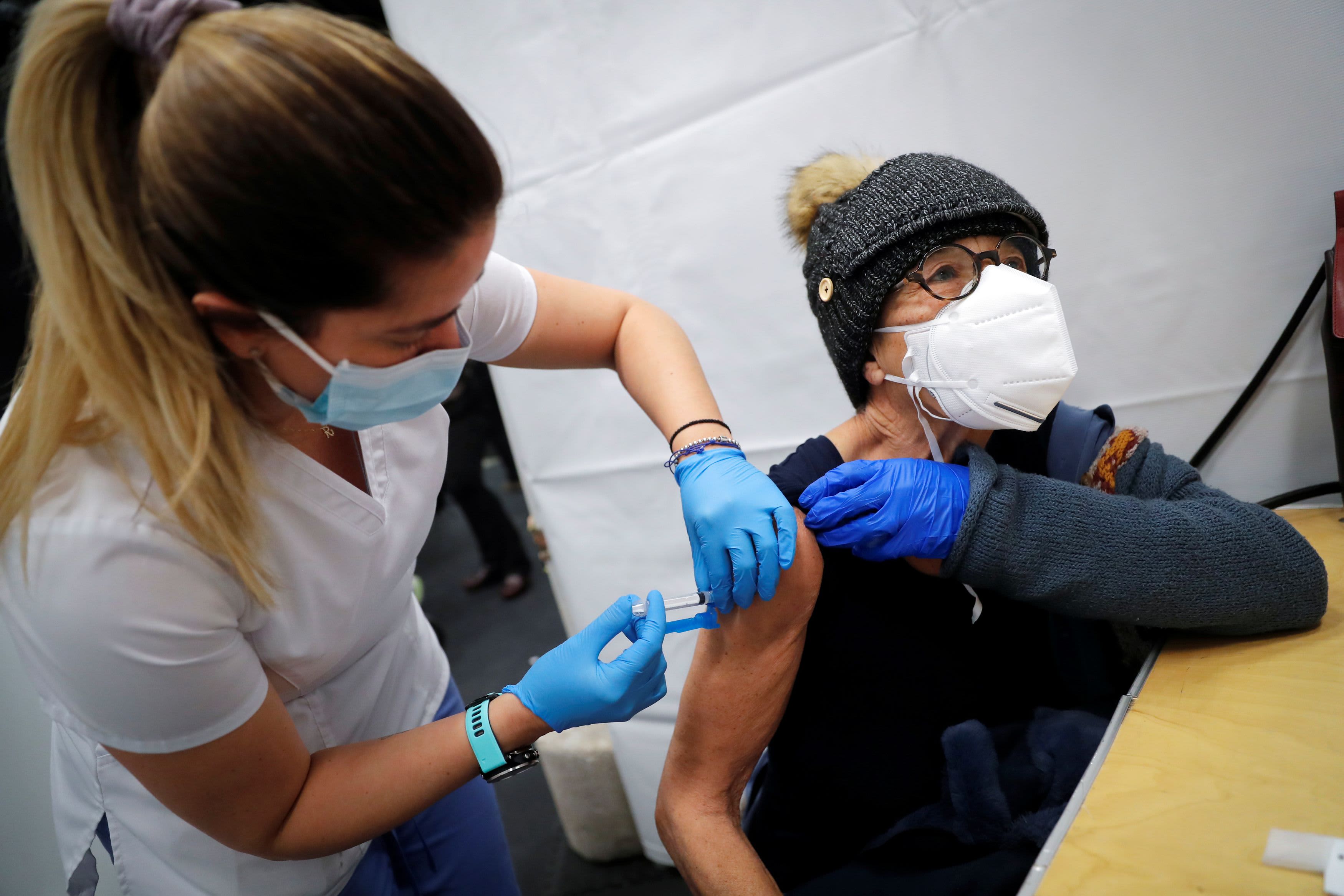A health worker administers an injection of the Moderna COVID-19 vaccine to a woman at a vaccination site operated by SOMOS Community Care during the coronavirus pandemic (COVID-19) in New York, January 29, 2021.
Mike Segar | Reuters
Moderna said on Wednesday that it had sent doses of a new Covid-19 vaccine to the National Institutes of Health designed to provide better protection against the spread of the highly contagious coronavirus variant in South Africa.
The vaccine – which Moderna calls mRNA-1273.351 – is ready to be tested in an initial clinical trial to determine whether it can be used as a booster injection against the South African strain, also known as B.1.351, the company said . Moderna found that its current two-dose regimen generates a weaker immune response against the South African strain, although the company said that antibodies in patients remain above expected levels of protection against the virus.
“Moderna is committed to making as many updates to our vaccine as necessary until the pandemic is under control,” Moderna’s CEO Stephane Bancel said in a press release. “We hope to demonstrate that booster doses, if necessary, can be made at lower dose levels, which will allow us to deliver many more doses to the global community in late 2021 and 2022, if necessary.”
US health officials are increasingly concerned about new emerging variants of the virus, particularly the B.1.351 strain, which has been shown to reduce the effectiveness of vaccines both on the market and in development. In recent weeks, the White House Chief Medical Adviser, Dr. Anthony Fauci, has urged Americans to get vaccinated as soon as possible before new and even more dangerous variants of the virus emerge.
As of Tuesday, the Centers for Disease Control and Prevention had identified 1,881 cases of variant B.1.1.7, first identified in the United Kingdom. The US agency said it had identified 46 cases of strain B.1.351 from South Africa, as well as five cases of P.1, a variant first identified in Brazil. As more people become infected, the more likely it is that even more problematic mutations will emerge, expert doctors say.
On Monday, the Food and Drug Administration released updated guidelines that modified Covid-19 vaccines, which work to protect against new emerging variants, can be authorized without the need for lengthy clinical trials. The FDA would approve the new vaccine as an amendment to a company’s originally approved emergency use request, thereby speeding up the regulatory review process.
Moderna first announced on January 25 that it was working on a firing boost to protect against the variant in South Africa.
The company said on Wednesday that it plans to evaluate three approaches to increasing immunity. The first approach would use variant-specific booster doses, such as mRNA-1273,351, but at a lower dose than the original vaccine. The second approach would combine the original vaccine with a variant-specific vaccine in a single injection of 50 micrograms or less, said Moderna. The third approach would test a third injection of the original vaccine at a lower dosage.
Moderna said it also plans to test the original vaccine and the new booster dose as a two-dose regimen in people without antibodies to the coronavirus.
Separately, the company also announced that it expects to produce up to 1.4 billion doses of the Covid-19 vaccine in 2022. It has also increased its global production estimate from 600 million doses to 700 million doses this year.
Moderna said 1.4 billion doses in 2022 assume that the vaccine will be administered at its current level of 100 micrograms. If the vaccine is found to be effective at a lower dosage level, the company could deliver up to 2.8 billion doses in 2022, the company said.
Moderna has an agreement with the United States government for 300 million doses. The company has shipped approximately 55 million doses to the United States. It expects to complete delivery of the first 100 million doses to the United States by the end of the first quarter of 2021, the second 100 million doses by the end of May 2021 and the third 100 million doses by the end of July 2021. .
